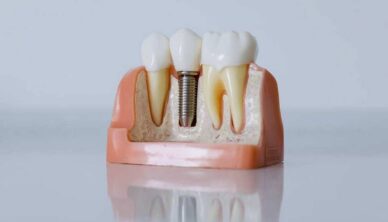Contents
Avoiding Peri-Implantitis

Peri-Implant Disease: Causes, Prevention and Treatment
Peri-implant disease, often referred to as peri-implantitis (PI), is a collective term for inflammatory conditions that can develop around dental implants. While there are subtle differences, PI closely resembles periodontal disease in natural teeth.
The underlying causes are also similar, with the formation of dental plaque being the primary contributor. Other risk factors include a history of periodontitis, tobacco use, excessive alcohol consumption, and medical conditions such as diabetes.
Identifying and treating signs of existing periodontal disease, or other oral health issues, is essential for the successful placement of dental implants.
Understanding individual needs is equally important. Proper physical preparation prior to implant placement can significantly reduce the risk of developing PI.
Appropriate Support
To ensure your implants last a lifetime—as they are designed to—each stage of treatment must be carried out correctly, with potential errors avoided. Risk factors should be carefully assessed, and your dental and medical history fully understood.
Tissue or bone augmentation prior to implant placement may be critical for a successful outcome. Technical precision is also key—from the emergence angle of the implant to its positioning and spacing.
If you have diabetes, osteoporosis, or other health conditions that may affect implant success, these must be considered. This is where working with a consultant who is both medically and dentally qualified proves invaluable.
Your consultant will advise on medical and lifestyle factors, as well as oral hygiene. While poor oral hygiene can contribute to PI, it is not the sole factor. A personalised approach that includes education, prevention, and follow-up care is essential.
Well-positioned, stable implants also support good hygiene by making cleaning easier and preventing discomfort during brushing. Limited access for cleaning has been identified in a significant number of PI cases.
In-Depth Research
Peri-implantitis has been studied extensively over the years. In August 2022, a research team conducted a comprehensive review of medical databases, analysing thousands of cases over a 16-year period.
Unsurprisingly, they confirmed the importance of good oral hygiene and regular hygiene visits—ideally twice a year—as well as managing medical conditions and addressing bruxism (tooth grinding).
However, many of their key findings focused on the quality of care provided during implant placement. This included factors already mentioned, such as precise positioning, correct spacing, and the overall planning and execution of treatment.
Ensuring adequate gingival tissue is also critical. Tissue grafting and bone augmentation or reduction may be necessary, as well as eliminating periodontal disease in surrounding teeth.
The research highlighted that long-term success depends heavily on planning, clinical knowledge, and technical skill. Even fine details—such as preventing the scattering of titanium particles into nearby tissues, which can trigger a foreign body reaction—can make a difference.
Overcoming Barriers
Like periodontal disease, peri-implantitis can lead to pain, swelling, and difficulty when biting or chewing. If left untreated, it can ultimately result in implant failure and the loss of the restored tooth.
Fortunately, PI can often be reversed if diagnosed in its early stages. If you are experiencing symptoms, consulting a qualified specialist can lead to successful treatment and restore the benefits of your implant.
As the research shows, alongside good oral hygiene, the best way to prevent PI is by understanding your personal risk factors and ensuring your implants are placed by skilled professionals.
If our Harley Street clinic can assist with dental implants or related treatment, please don’t hesitate to get in touch.
7 July 2023



